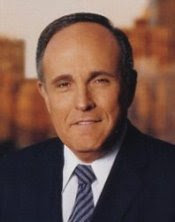Rudy Giuliani: Take Me or Leave Me
 Rudy Giuliani: Take Me or Leave Me
Rudy Giuliani: Take Me or Leave Me
By Roger SimonApr 12, 2007
CHARLESTON, S.C. — Rudy Giuliani says that the standard for judging his troubled personal life should be how it affected or did not affect the job he did as mayor of New York. "We all have personal lives, we all have things that go right and wrong in our personal lives," he told me. "The real question is: How does it affect how you can perform?"
"Does the fact that I may have had some problems in my personal life mean that I don't perform my job or I can't perform it well?" he continued. "Or does it mean that, despite them, I still was able to take a city that was the crime capital of America and turn it into the safest large city in America."
Giuliani said he removed 660,000 people from the welfare roles in New York, turned a budget deficit into a surplus and "had to deal with the worst crisis in the history of our city upfront and directly," a reference to the terrorist attack of Sept. 11, 2001.
"So I would ask people to look at that," Giuliani said in the half-hour interview. "They can know everything about me. They will find out everything about me. But then, how has it (i.e., personal problems) affected me?"
Giuliani's argument is unlikely to satisfy some of his critics among social and religious conservatives, who would suggest that personal behavior should not be judged solely on whether it affects your job performance.
Christian conservatives, who play an important role in Republican politics in South Carolina, might argue that behavior also should be judged as to whether it is moral or immoral.
In 2000, when Giuliani was mayor of New York, news of his extramarital relationship with Judith Nathan became public. Giuliani announced at a press conference that he was separating from his wife, something she did not know beforehand. Giuliani filed for divorce and married Nathan in 2003.
I reminded Giuliani that South Carolina was the site of a vicious Republican primary campaign in 2000, in which John McCain was the subject of venomous attacks by supporters of George W. Bush.
Has it crossed your mind that this may be an extremely rough primary in 2008? I asked him. "It has, and it will be," Giuliani replied. But he also said he did not think the attacks would come directly from other Republican presidential candidates.
"I think more of this comes from the ... blogging atmosphere, in the instant news atmosphere and the minute-analysis atmosphere," he said.
Giuliani's positions on abortion, gun control and gay rights are very moderate by Republican standards, and some political analysts have said he cannot be nominated because of them. But Giuliani said in the interview he would not change. "I am not going to change who I am," he said. "I think that would be a terrible mistake. Better off you vote against me than I change who I am. Because then I couldn't be an effective president."
Giuliani also said being attacked was nothing new to him. "This went on every day when I was mayor of New York," he said. "So you get used to it. And you learn where you put it."
Giuliani, who leads virtually all polls for the Republican nomination by large margins, admitted that he has made some mistakes. "You have a balance of things you did right and things you did wrong, and the mistakes you made are very public ones," he said. "The question is: What's the balance? Is the balance a balance of success or not?"
I asked Giuliani if he was asking Republican voters to pass up candidates who were more "ideologically pure" and vote for him because of his record as mayor. "Part of my message is you might find on some issues there are more ideologically pure candidates — whatever that means — but I bet you are not going to find one on fiscal conservatism that's stronger than I am," he said. "I don't think you will find a candidate who has had more experience in dealing with terrorism. And I bet you will not find a candidate that has had more executive experience than I have had. In fact, I don't think you will find one that has had as much."
He also said that Republican voters should look at all of his positions on the issues. "If nine out of 10 times you agree with me," he said, "then maybe you should consider me as your candidate, unless the one reason you disagree with me is so important to you that you can't. And I respect that."





